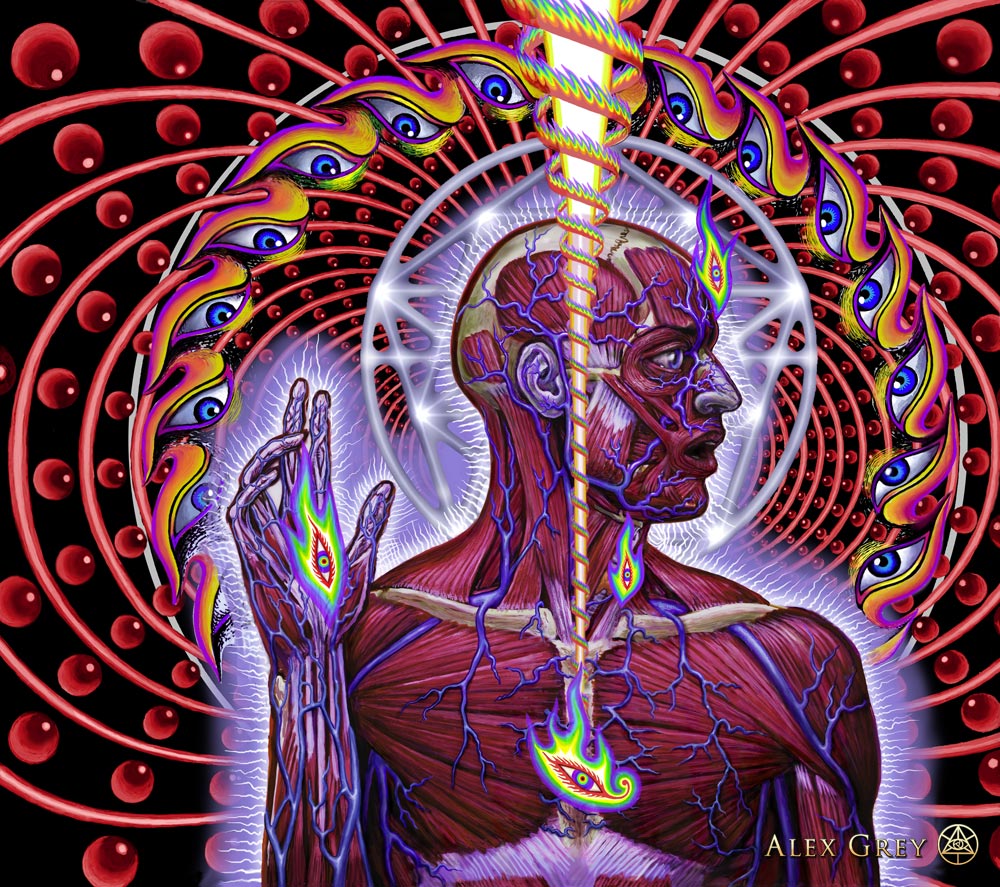Friday 16th January 2015

If you're familiar with the progressive/art-rock band Tool, you're probably familiar with the work of Alex Grey. His artwork has adorned many of their latest albums, and this helped to widely popularize his work among a certain generation. A remarkably unique contemporary artist, his style is incredibly intricate and detailed, often incorporating repetitive fractal geometries and the human form.
While Grey works in a number of media, his primary focus is on painting, and he has created an impressively large body of work. The underlying themes tend to be extremely gentle, caring, and uplifting, which is a refreshing change from we see so much of today. The New York Times said, "Grey’s vision of a flawed but perfectible mankind stands as an antidote to the cynicism and spiritual malaise prevalent in much contemporary art," and they are exactly correct.
To be fair, there is a certain amount of hippie-drug-culture-age-of-aquarius-flakiness involved as well, but it's hard to find much fault with that when the underlying message is so overwhelming positive. It may not be for everyone, but it's nice to know they're out there.
“My art has always been in response to visions. Rather than confine myself to representations of the outer worlds, I include portrayals of multi-dimensional imaginal realms that pull us towards consciousness evolution.”
Some of the most exciting contemporary artwork is being done by people who are willing to be completely open and honest about their love of humanity, reality, and the world itself, and it makes the art world's currently fashionable ironic cynicism feel hollow and disgusting. The fact that Grey has wound up his art almost entirely as an extension of his philosophies about the universe, the nature of reality and the value of mystical experience communicates the genuine nature of his convictions, something that has been lacking in the art world for far, far too long.
As the generation of artists, thinkers and philosophers who have been influenced by his work and his ideas, hopefully it will coincide with a backlash against the frustratingly apathetic cynicism that postmodernism has gifted us with, and that has gripped us all for too long. It's still useful, of course - but as in all things, balance is the most important.
Posted on January 16th 2015 on 04:44pm
 If you're familiar with the progressive/art-rock band Tool, you're probably familiar with the work of Alex Grey. His artwork has adorned many of their latest albums, and this helped to widely popularize his work among a certain generation. A remarkably unique contemporary artist, his style is incredibly intricate and detailed, often incorporating repetitive fractal geometries and the human form.
If you're familiar with the progressive/art-rock band Tool, you're probably familiar with the work of Alex Grey. His artwork has adorned many of their latest albums, and this helped to widely popularize his work among a certain generation. A remarkably unique contemporary artist, his style is incredibly intricate and detailed, often incorporating repetitive fractal geometries and the human form.



